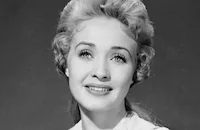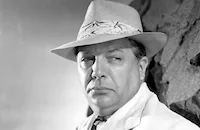Nancy Goes to Rio

Brief Synopsis
Cast & Crew
Robert Z. Leonard
Ann Sothern
Jane Powell
Barry Sullivan
Carmen Miranda
Louis Calhern
Film Details
Technical Specs

Synopsis
On the closing night of a Broadway play, leading actress Frances Elliott hosts a party attended by many guests, including her eccentric father Gregory, who is also an actor; her seventeen-year-old daughter, Nancy Barklay, an aspiring actress; and Brazilian playwright Ricardo Domingos, who is considering starring Frances in his next play. Frances eagerly pursues the part in Ricardo's play, and though she is virtually assured of the role, Ricardo asks her not publicize the news until a final decision is made. Later, Ricardo privately tells Frances' producer that Frances may not be right for the part and that he had a younger actress in mind. Then,when Ricardo meets Nancy, he instantly knows that he has found the perfect young woman for the role.
The next day, Frances sets sail for Rio de Janeiro, where she intends to vacation and devote herself to studying her lines. Gregory accompanies Frances to Rio de Janeiro, while Nancy, who is about to star in a small stock company play, goes to Connecticut. After observing Nancy's acting abilities, Ricardo offers her the part that he promised Frances. Nancy accepts the role, though she is unaware that Ricardo has already promised it to her mother. Seeking the quiet she needs to study for the part, Nancy follows her mother and grandfather to Rio de Janeiro.
On board the ship, businessman Paul Berten overhears Nancy rehearsing her lines and mistakenly concludes that she is a deserted wife and an expectant mother. Paul takes pity on Nancy and enlists the help of his business partner, Marina Rodrigues, to counsel the young girl. Nancy does not know that Paul is trying to help her and mistakes his paternal concern for a marriage proposal. She rejects Paul's apparent proposal, and bids him farewell when the ship reaches Rio de Janeiro. Soon after she is reunited with her mother, Nancy overhears her rehearsing her lines and immediately realizes that they are studying for the same part. The revelation devastates Nancy and prompts her to bow out of the play. She does not tell her mother that she was set to star in Ricardo's play, and instead informs her that she came to Rio de Janeiro to get married.
Confusion abounds when Nancy later visits Paul at his office and tries to accept the marriage proposal she thought he had made. Paul is perplexed by her behavior, and still thinks that Nancy is pregnant and troubled. He sends her home to talk to her mother about her situation, but Nancy misunderstands him and thinks that he meant for her to discuss their impending marriage with her mother. Marina follows Nancy to her mother's house, and privately tells Frances about Nancy's supposed pregnancy. The confusion is heightened when Frances misunderstands her daughter's anguish and concludes that she must be pregnant by Paul. Frances demands a private meeting with Paul, during which Paul reveals his romantic attraction to Frances. Frances leaves Paul in disgust, but the situation is soon clarified when Paul tells Gregory that he just met Nancy.
Gregory immediately recognizes Nancy's supposed predicament from the story of the play that Frances was reading, and explains the situation to Frances. When Frances learns the truth about Paul, she changes her impression of him and they embark on a romance. After announcing her engagement to Paul, Frances withdraws from Ricardo's play and suggests Nancy as her replacement. All ends happily when the show opens in New York with Nancy in the starring role.

Director

Robert Z. Leonard
Cast

Ann Sothern

Jane Powell

Barry Sullivan

Carmen Miranda

Louis Calhern

Scotty Beckett

Fortunio Bonanova
Glenn Anders

Nella Walker

Hans Conried
Frank Fontaine
Banda Da Lua
Leon Belasco

Leonid Kinskey
Danny Scholl
Ransom Sherman
Betty O'kelly
Shirley Powell
Dolores Boucher
Rudy Wissler
Freddie Chapman
Charles Smith
Jerry Rush
Dick Humphreys
Ted Eckelberry
Edward Vargo
Bob Valentine
Fred Kelsey
William Forrest
Sue Casey
John Goldsworthy
Jean Andren
Bert Moorhouse
Bert Davidson
Wilson Wood
Forbes Murray

Pierre Watkin
Frank Wilcox
Michael Raffetto

Cy Kendall
Helen Dickson
Wilbur Mack
Carlos Barbé
Ana Camargo
Teresa Celli

Sig Arno
Joaquin Elizondo

Bess Flowers
Patricia Elliott
Rena Lenart
Irene Booth
Patricia Ann Taylor
Crew
John Banse
Joao De Barro
Nora Bayes
Ralph Block
Earl Brent
Eric Carpenter
Nick Castle
Jack Dawn
Dale Deverman
Randall Duell
Adrienne Fazan
George Gershwin
Ira Gershwin
Giuseppe Giacosa
Cedric Gibbons
Ray Gilbert
A. Arnold Gillespie
Bert Glazer
James Gooch
Maria Grover
Sydney Guilaroff
Jane Hall
Luigi Illica
Henri Jaffa
Ray June
Frederick Kohner
Robert Z. Leonard
Lauro Maia
Dave Marks
Roberto Martins
Jack Norworth
Charles Pasquale
Joe Pasternak
Richard A. Pefferle
Sergei Petschnikoff
Mervyn Price
Giacomo Puccini
Helen Rose
Douglas Shearer
Sidney Sheldon
Jack Martin Smith
Fred Spielman
Georgie Stoll
Georgie Stoll
Charles E. Wallace
Edwin B. Willis

Photo Collections
Film Details
Technical Specs

Articles
Nancy Goes to Rio
Powell had signed with MGM in 1944 at the age of 15 after impressing talent scouts with her surprisingly mature soprano voice on the radio. After two years of loan-outs to other studios, she was handed to producer Joe Pasternak, who had made a star of child soprano Deanna Durbin at Universal Pictures. Durbin had originally been under contract at MGM, but the studio had released her, only to see her save Universal from bankruptcy in the late '30s. From that point, studio executives at Metro had been consumed with finding a Durbin of their own, and Powell fit the bill perfectly. They even bought remake rights to some of Durbin's hits. That Certain Age (1938) became Powell's first MGM picture, renamed Holiday in Mexico (1946), followed by a remake of Three Smart Girls (1936) as Three Daring Daughters (1948). In 1950, they remade It's a Date (1940) -- about an aspiring actress who finds herself competing with her mother (Sothern) for the same role and the same man (Barry Sullivan) -- as Nancy Goes to Rio. Complicating matters was the false suspicion that Powell's character was pregnant, a bow to the fact that MGM's little singing star was growing up.
She was growing up off-screen, too. She had married former ice skater Geary Anthony Steffen II a year earlier, and would have her first child in 1951. She underwent another rite of passage during rehearsals, when she raised her arms during a dance number, and choreographer Nick Castle realized that she had never been told to shave under her arms. Powell would later write in her memoirs (The Girl Next Door...and How She Grew) that her mother had never really explained adult life to her. Castle took her aside and explained that it was time she started shaving her legs and under her arms. MGM would finally admit that Powell was an adult with her next film, Two Weeks With Love (1950), in which she shared billing with her first grown-up romantic interest, Ricardo Montalban.
For Sothern, Nancy Goes to Rio marked the end of her long association with MGM. Although she had appeared in a few of their films while under contract to other studios, Metro had finally signed her in 1939 to play the title role in Maisie, a comic adventure written for the late Jean Harlow. Sothern starred in six more Maisie films, all of them low budget, though they actually were more popular than many of the studio's A pictures. She also toplined some major films there, including the musicals Lady Be Good (1941) and Panama Hattie (1942), though bad luck and bad timing kept her out of some roles that could have thrust her into the studio's top ranks. She finished her contract with Undercover Maisie in 1947. Nancy Goes to Rio would mark her last appearance at the studio and her final big-screen musical before finally hitting the big time with the television series Private Secretary in 1953.
Nancy Goes to Rio marked the end of Miranda's tenure at MGM, too, though she had only been with the studio for two films. She had spent most of her U.S. film career at 20th Century-Fox, helping the studio develop a large audience in Latin America to replace the European markets lost in the '40s because of World War II. When the war ended, however, Hollywood's fascination with all things Latin began to decline, and Miranda found her image as the "Brazilian Bombshell" limited her screen possibilities, even though she had been the highest paid entertainer of the '40s. She signed with MGM for the Powell musical A Date With Judy (1948), in which her tempestuous comedic presence and exotic musical numbers provided a perfect contrast to Powell's more homespun charms. For her second MGM picture, she was just about the only authentic thing about the film's Rio de Janeiro setting. The picture never left the backlot, where most of the landmarks were painted backdrops. When the film was released, Brazilian audiences couldn't miss the fact that such well-known landmarks as Sugar Loaf and the Corcovado Mountain were shown almost side by side, even though they're miles apart in reality. Miranda's big number was the traditional song "Caroon Pa Pa," for which costume designer Helen Rose replaced the fruit the singing star usually wore in her famous "tutti frutti" hats with tiny umbrellas. Despite getting some of the film's strongest reviews, Miranda had no future projects at MGM. She would only make one more film, the Dean Martin-Jerry Lewis comedy Scared Stiff (1953), before her sudden death from a heart attack in 1955.
Producer: Joe Pasternak
Director: Robert Z. Leonard
Screenplay: Sidney Sheldon
Based on a story by Jane Hall, Frederick Kohner & Ralph Block
Cinematography: Ray June
Art Direction: Cedric Gibbons, Jack Martin Smith Music: George Stoll, Ray Gilbert
Principal Cast: Jane Powell (Nancy Barklay), Ann Sothern (Frances Elliott), Barry Sullivan (Paul Berten), Carmen Miranda (Marina Rodriguez), Louis Calhern (Gregory Elliott), Scotty Beckett (Scotty Sheldon), Hans Conried (Alfredo), Frank Fontaine (Masher).
C-100m. Closed Captioning.
by Frank Miller

Nancy Goes to Rio
TCM Remembers - Ann Sothern
TCM Remembers - Ann Sothern
Quotes
Trivia
Notes
The working titles of this film were Ambassador to Brazil and His Excellency from Brazil. A September 1949 Hollywood Reporter news item lists dancer and actress Nita Bieber in the cast, but her appearance in the final film has not been confirmed. According to a late January 1950 Daily Variety news item, a routine called "Mention My Name in Sheboygan," with Jane Powell and Scotty Beckett, was cut from the film before its release. The 1940 Universal film It's a Date, produced by Joe Pasternak, directed by William A. Seiter and starring Deanna Durbin and Kay Francis, was also based on Jane Hall, Frederick Kohner and Ralph Block's screen story (see AFI Catalog of Feature Films; 1931-40, F3.2185).















